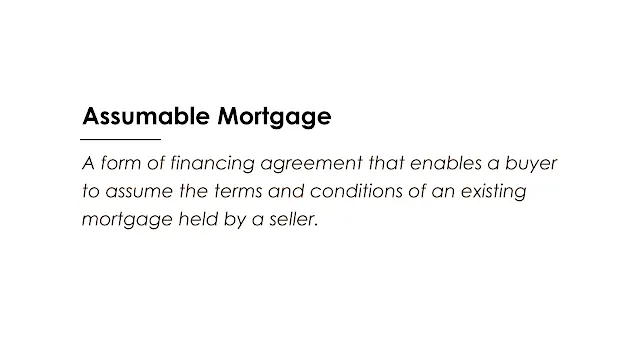 |
| Image: Moneybestpal.com |
An assumable mortgage is a form of financing agreement that enables a buyer to assume the terms and conditions of an existing mortgage held by a seller. This means that instead of applying for a new mortgage, the buyer can just keep repaying the seller's loan balance, interest rate, and repayment term.
In some circumstances, assumable mortgages can be advantageous for both purchasers and sellers, particularly when interest rates are high or on the rise. By avoiding closing charges, appraisal fees, and other costs related to securing a new mortgage, buyers can save money. Also, they may benefit from an interest rate that is lower than the going rate on the market, which will cut their monthly payments and overall interest costs over the course of the loan. Assumable mortgages help sellers by drawing in more customers searching for inexpensive financing solutions. If their mortgage has a prepayment penalty, they can also avoid paying it.
Assumable mortgages, however, are not offered for all loans or types of properties. Under specific circumstances, only mortgages backed by the government—such as FHA, VA, and USDA loans—can be assumed. Conventional loans cannot be assumed since they are not covered by federal insurance or guaranteed by the government. A buyer must also meet the same eligibility requirements as the original borrower, including credit score, income, and debt-to-income ratio because assumable mortgages are subject to lender approval. To confirm the property's worth, the lender may potentially impose fees or demand a fresh appraisal.
Furthermore, depending on the amount of equity the seller has amassed, assumable mortgages might not fully cover the cost of the property. A second mortgage or cash payment of the difference between the loan outstanding and the property's value may be required of the buyer. The upfront expenses and total debt owed by the buyer may rise as a result.
The advantages and downsides of taking on a mortgage should therefore be carefully considered, as well as how they stack up against other financing options before a decision is made. To fully grasp the risks and legal ramifications, they ought to speak with their real estate agents, lenders, and attorneys.
Here is an overview of the three types of assumable mortgages and how they work:
FHA Loans
The Federal Housing Administration, a division of the Department of Housing and Urban Development (HUD), insures FHA loans as mortgages. Due to their low down payment requirements (as little as 3.5%), lenient credit requirements, and cheap interest rates, FHA loans are well-liked by first-time homebuyers and borrowers with low to moderate incomes.FHA loans are assumable, but only if the buyer meets the following requirements:
- The property must be used as the purchaser's principal residence.
- According to FHA requirements, the purchaser must be eligible for the loan.
- A charge for assumption must be paid by the buyer that is equal to 0.5% of the loan balance or $500, whichever is less.
- The assumption agreement that transfers the loan's rights and liabilities to the buyer must be signed by them.
- The assumption must receive the lender's approval before the seller is absolved of responsibility.
The seller must also comply with FHA's rules for selling a property with an assumable mortgage:
- The seller must seek an assumption package from the lender and inform the lender of their intention to sell the property.
- A copy of the mortgage note, HUD-1 settlement statement, payment history, and any other pertinent paperwork must be given to the buyer by the seller.
- At the time of closing, the seller must make sure the loan is current and in good standing.
VA Loans
The Department of Veterans Affairs, a division of the Department of Defense, guarantees VA loans, which are mortgages. Veterans, service members on active duty, reservists, National Guard members, and surviving spouses who haven't remarried are all eligible for VA loans. Contrary to traditional loans, VA loans have a number of benefits, including no down payment, no private mortgage insurance (PMI), low-interest rates, and flexible credit requirements.VA loans are assumable, but only if the buyer meets one of these two conditions:
- The buyer agrees to take the seller's entitlement in lieu of their own as they are both qualified veterans.
- Despite not being a qualified veteran, the buyer accepts the VA's release of liability and agrees to take on all loan obligations.
Before transferring their loan to another borrower, the seller is also required to get approval from the lender and/or the VA. A funding fee of either 0.5% of the loan total or $300, whichever is higher, may be owed by the seller.
USDA Loans
The U.S. Department of Agriculture (USDA), a division of the Department of Agriculture, provides mortgages that are guaranteed by USDA loans. In order to encourage home ownership in rural regions, USDA loans provide eligible low- to moderate-income borrowers with low- or no-down payment alternatives, low-interest rates, and flexible credit standards.USDA loans are assumable, but only if both parties meet these requirements:
- A primary dwelling must be used by the purchaser.
- Under the income and credit requirements of the USDA, the buyer must be eligible for the loan.
- A charge for assumption is due from the buyer, and it's either $50 or 0.5% of the loan principal.
- All rights and liabilities associated with the loan must be transferred to the buyer by way of an assumption agreement, which must be signed.
- The assumption and release of liabilities for the seller from the lender and USDA must be approved.
